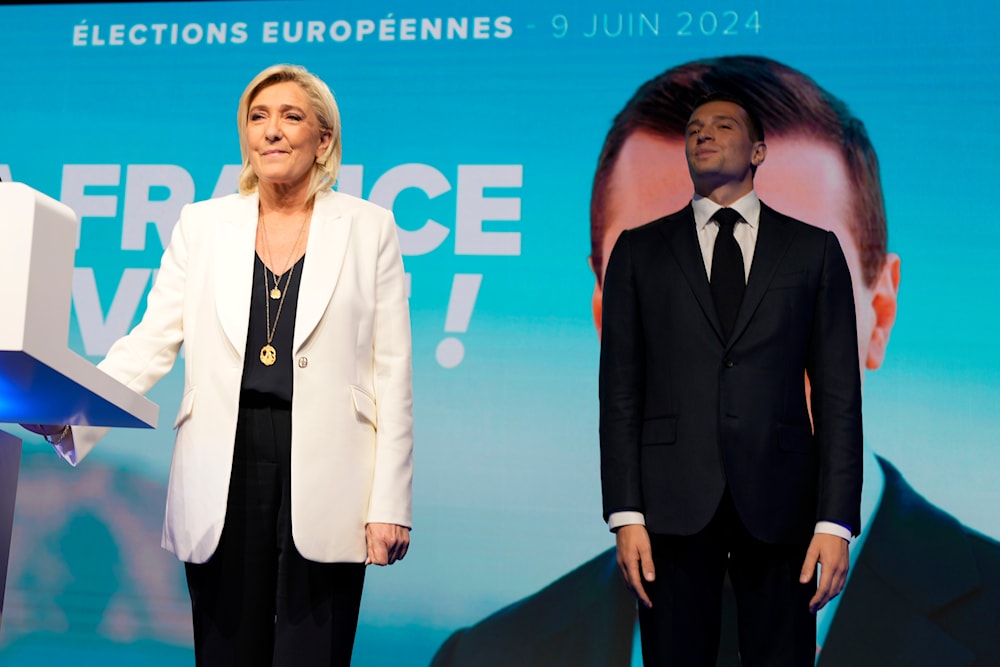EU elections see far-right advance in key France, Germany
France's National Rally and Germany's AfD, both far-right parties, advance in the EU parliament.
-

French far-right leader Marine Le Pen and Jordan Bardella, president of the French far-right National Rally, stand at the party election night headquarters, Sunday, June 9, 2024 in Paris. (AP)
Sunday's EU elections saw significant gains for the far-right, as exit polls indicate Marine Le Pen's National Rally in France and Alternative for Germany leading the governing parties, potentially shifting the balance within the European Parliament at a critical juncture.
In France, Le Pen's party is projected to secure around 33% of the vote, translating to 31 seats in the European Parliament. This result more than doubles the score of President Emmanuel Macron's liberals, who are at 15%.
Meanwhile, in Germany, the Alternative for Germany party overcame a series of pre-election scandals to claim second place with approximately 16%, ahead of Chancellor Olaf Scholz's Social Democrats and its coalition partners.
Check out: Your guide to the EU Parliament election
These outcomes represent significant blows to Europe's right-wing that are masquerading as centrists as the far-right gains significantly more sway within the EU's legislative body. However, despite these gains, the far-right factions remain fragmented and are expected to remain on the sidelines in Brussels.
Predictions indicate that the center-right and center-left parties, along with centrist partners, will likely retain a majority.
Le Pen's triumph in France had been anticipated, as her party previously led the European polls in 2019.
A right-wing shift
Over 360 million people across the EU's 27 nations were eligible to vote over four days in elections that will shape the EU's direction for the next five years. The vote comes amid challenges such as the Ukraine war, global trade tensions, a climate emergency, and the potential for another Trump presidency.
The new parliament will play a crucial role in deciding the leadership of the European Commission, with increasingly unpopular German conservative Ursula von der Leyen seeking a second term.
European voters, grappling with high living costs and social concerns, are increasingly drawn to populist messages. While centrist parties are expected to retain the majority of the 720 seats, they may face challenges from a strengthened far-right pushing for more conservative policies.
Germany saw its highest turnout since 1979 at 66%, yet this did not spare Chancellor Scholz from a poor showing. His Social Democrats, at 14%, were outpaced by the far-right AfD at 16-16.5% and significantly lagged behind the conservative CDU-CSU bloc's 29.5%.
In Austria, the far-right Freedom Party led the count for the first time in a nationwide ballot. Migration policy and climate change were key issues for voters.
In the Netherlands, the far-right Freedom Party of Geert Wilders came second with 17.7%, trailing the Green-Labour coalition led by Frans Timmermans.
Italy's far-right ruling Brothers of Italy party, led by Prime Minister Giorgia Meloni, is expected to top the vote.
Meloni's support is being sought by both von der Leyen for her second mandate and by Le Pen and Hungarian Prime Minister Viktor Orban, who aim to form a far-right supergroup in parliament.
EU future in danger
Last month, Spain's environment minister, Teresa Ribera, warned that the European Union's future is in danger due to individuals "who exploit social tensions for immediate political advantage." She emphasized that the European project faces the risk of "implosion" ahead of the upcoming European parliamentary elections.
Meanwhile, a shift in politics in Europe has created a scare for mainstream parties as more pro-Palestine supporters are gearing toward left-leaning parties with a more vocal pro-Palestine stance.
Blandine Chelini-Pont, a historian at Aix-Marseille University, said that far-left La France Insoumise (LFI) is seeking to ban arms and impose sanctions on "Israel" while recognizing a Palestinian state, as well as refrain from calling the Palestinian Resistance Hamas a "terrorist group", thus attracting Muslim and radical-left voters.
LFI lawmaker Sebastien Delogu told Reuters, "Some will say we are surfing on an electorate but who are we speaking about? These are citizens of this country who do not have a racist vision of society."

 4 Min Read
4 Min Read








